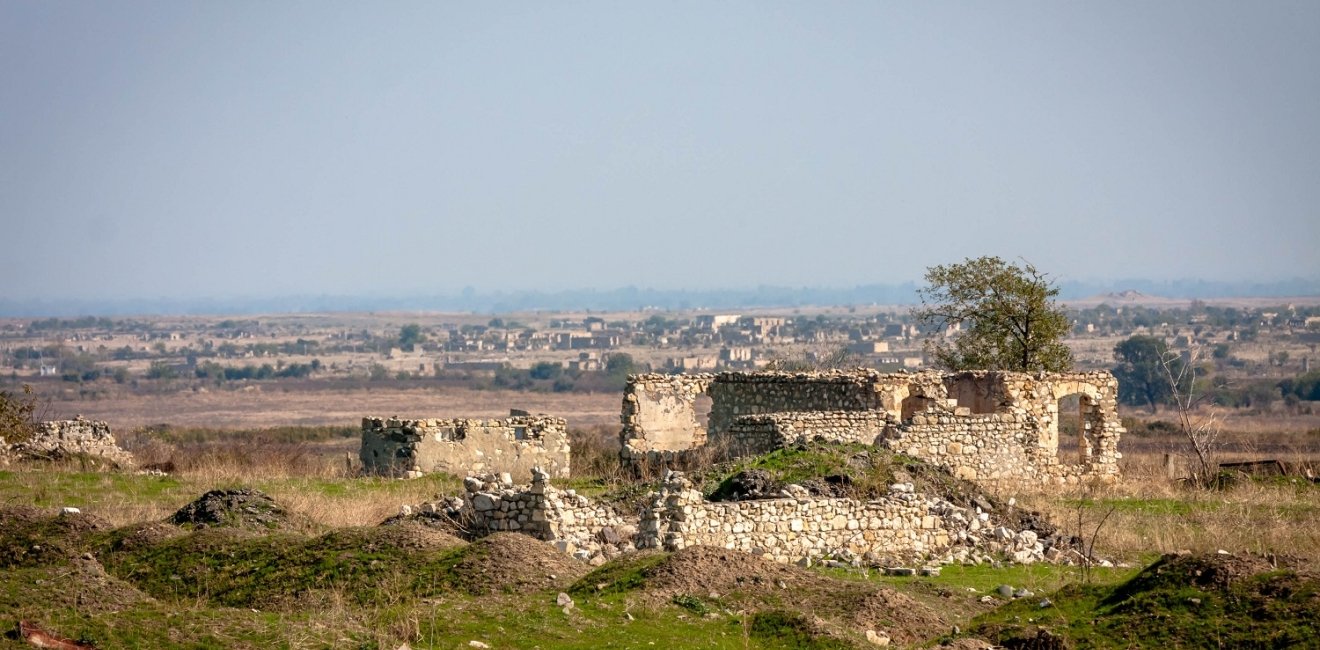
A blog of the Kennan Institute
BY RAHIM RAHIMOV
Recent events in the self-proclaimed republic of Nagorno-Karabakh, an unrecognized Armenian-populated state within Azerbaijan, have marked an important shift in geopolitics. Russia has effectively admitted Turkey as a new player in its former “backyard,” the South Caucasus, and set out to redefine the rules of the game in this relatively small region with the US and the European Union noticeably absent from the new arrangement.
On September 27, a decades-long simmering conflict between Armenia and Azerbaijan over Karabakh erupted into open hostilities. Thousands were killed in the ensuing six weeks of fighting, which continued until Russian President Vladimir Putin, in a televised address on November 10, announced a nine-point agreement between Armenia and Azerbaijan. The document recognized a significant loss of ground for Nagorno-Karabakh, which triggered antigovernment protests in Armenia and celebrations throughout Azerbaijan. However, the agreement does not address the crux of the matter, the status of Nagorno-Karabakh.
Baku has treated the omission as a deliberate move to strike the status issue off the agenda. However, Putin suggested that that the status must be resolved in his interview on Tuesday, a stance that was reiterated by Russia’s Foreign Ministry. Otherwise, Baku’s refusal to discuss the status of Karabakh may provoke a new wave of conflict, according to Russian Deputy Foreign Minister Andrey Rudenko.
Neither a ceasefire nor a peace accord, the document, formally a “statement” or zayavlenie, offers guidelines for a possible future peace agreement. Under the statement, Azerbaijan retains control of the areas its armed forces managed to take back prior to November 10. Those territories include four of the seven districts surrounding the disputed Karabakh region that were to be vacated by Armenian forces according to the Madrid Principles, introduced a decade ago by the OSCE Minsk Group in an effort to achieve a phased settlement of the Nagorno-Karabakh conflict, plus Agdam, Kelbajar and Lachin, which are also on the Madrid Principles list but are still held by Armenian forces. Azerbaijan authorities say the Madrid Principles are no longer valid as they do not reflect the new reality on the ground. Azerbaijan wants control of all of its internationally-recognized territory and the exclusion of Armenian forces therefrom.
As part of the document, Russian peacekeeping troops will be deployed along the line of contact and also along the Lachin corridor connecting the Karabakh region to the Republic of Armenia. Armenia voiced support for peacekeeping troops well before the announcement of the deal. Azerbaijan had its concerns, based on the post-Soviet space’s previous experience with Russian peacekeepers who, once deployed, tend to stay indefinitely.
In exchange for Azerbaijan opening the Lachin corridor for the Armenians, a transport route for the Azerbaijani through Armenia is planned to be established between mainland Azerbaijan and the Azerbaijani exclave of Nakhchivan. This route would also serve as a direct inland corridor from Azerbaijan to Turkey.
In recognition of Turkey’s role as Azerbaijan’s backer and ally, a joint Russian-Turkish peacekeeping center will be established to oversee the ceasefire.The center is to be located on the Azerbaijani side of the contact line. While Turkey has been eager to cement its influence in the region, Russia is trying to preserve as much clout in the formerly Soviet South Caucasus as it possibly can.
Locating the center inside Azerbaijan would call attention to the Turkish presence in the South Caucasus, part of Russia’s traditional “backyard.” On Tuesday, at the request of the Turkish president Recep Tayyip Erdoğan the Turkish parliament passed a bill authorizing a deployment of the country’s armed forces at the Russian-Turkish peace centre in Azerbaijan.
Turkey’s presence at the peace center will somewhat assuage Azerbaijani doubts about Russia’s ability to execute the role of a neutral peacekeeper. There are also other reasons explaining why the Azerbaijani public has been calling for a Turkish military presence in the country. Chiefly, Azerbaijan trusts Turkey more than it does Russia. Skepticism about Moscow’s motives has been exacerbated by the sudden deployment of Russian peacekeepers to Azerbaijan, even with Baku's consent. Nor has Russia won friends in the country by joining with the West in attributing Azerbaijani military victories to alleged “Syrian mercenaries or terrorists”—to Azerbaijanis, this is a sign of Moscow’s participation in a huge international disinformation campaign. The Turkish-Russian partnership in the Karabakh conflict will make the ceasefire sustainable, but the geopolitical instability remains.
The Turkish presence is a new reality in the region that will reset the balance of power between Russia and Turkey; the exact lineaments remain to be determined. Noticeably absent from the new arrangement are the usual Western powers. Russia and Turkey will meet again soon in Moscow for another round of talks, and they will determine the contours of the emerging new status quo. In the meantime, it is almost certain that the Armenian-Azerbaijani Karabakh conflict is not over. When it heats up again, it will be with additional complexities in a changed geopolitical landscape
The Kremlin has been criticized for not taking a tougher stance to defend the status quo on behalf of Russia’s long-standing ally, Armenia by both domestic and foreign commentators. “This is managing decline, a Russia that in regional terms is strong in capacities, weak in will, trying to make the best of a situation, and in the process disappointing its allies and doing nothing to deter its challengers,” Mark Galeotti, a senior associate fellow at the Royal United Services Institute, wrote in the Moscow Times.
In contrast, the development illustrates the Kremlin’s new “strategic restraint,” the well-informed foreign policy commentator Vladimir Frolov wrote for Republic.ru. According to Frolov, the Kremlin has taken stock of the moves it had made in Georgia, Ukraine, and Syria and decided to minimize its interventionism going forward. Per Frolov, some of the principles of that new approach to the post-Soviet space include: “Do not do anything on top of what is absolutely necessary based on the existing treaties and agreements; make Moscow’s aid contingent on the recipients’ conformity with Moscow’s geopolitical agenda; support post-Soviet client states and leaders but not at the expense of new Western sanctions against Russia.”
The jury is still out on whether this policy change is strategic or just cyclical, informed by lower oil prices and Moscow’s unwillingness to expose itself to more Western pressure. What is clear is that Moscow has thoroughly enjoyed the role of a regional arbiter in the absence of the US or the European Union.
The opinions expressed in this article are those solely of the author and do not reflect the views of the Kennan Institute.
Author


Kennan Institute
After more than 50 years as a vital part of the Wilson Center legacy, the Kennan Institute has become an independent think tank. You can find the current website for the Kennan Institute at kennaninstitute.org. Please look for future announcements about partnership activities between the Wilson Center and the Kennan Institute at Wilson Center Press Room. The Wilson Center is proud of its historic connection to the Kennan Institute and looks forward to supporting its activities as an independent center of knowledge. The Kennan Institute is committed to improving American understanding of Russia, Ukraine, Central Asia, the South Caucasus, and the surrounding region through research and exchange. Read more

Explore More in The Russia File
Browse The Russia File
Chechnya as a Model of Modern Russia

Russia’s Indigenous Communities and the War in Ukraine

Gas and Power in a Changing US–Russia Relationship

